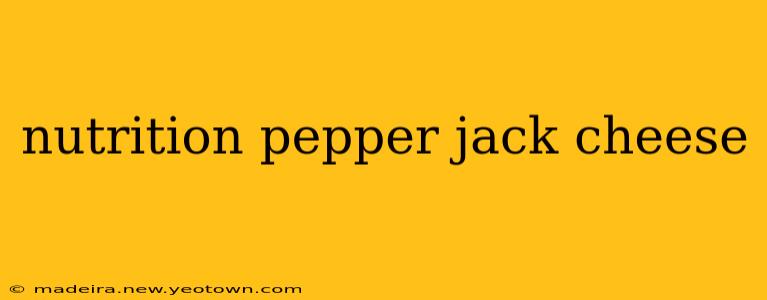Pepper Jack cheese. Just the name conjures up images of spicy, melty goodness drizzled over nachos or tucked inside a perfectly grilled cheese sandwich. But beyond its deliciousness, what's the nutritional story behind this fiery favorite? Let's dive in and uncover the facts, tackling some common questions along the way.
What is Pepper Jack Cheese Made Of?
Pepper Jack cheese's fiery kick comes from the addition of jalapeños or other chili peppers during the cheesemaking process. The base is typically cow's milk, although some variations may use goat's milk or a blend. The milk is cultured, then rennet is added to coagulate the milk solids, separating the curds from the whey. The curds are then cooked, drained, and pressed before being aged, during which the peppers infuse their flavor and heat. The final product boasts a semi-hard texture and a distinct, spicy flavor profile.
How Many Calories Are in Pepper Jack Cheese?
One ounce of Pepper Jack cheese typically contains around 100-110 calories. However, calorie content can vary depending on the brand, fat content (some varieties are lower fat), and the specific type of pepper used. It's always best to check the nutrition label on the specific product you're consuming for the most accurate information. Remember, portion control is key when enjoying this flavorful cheese!
Is Pepper Jack Cheese Healthy?
Like most cheeses, Pepper Jack offers a good source of protein and calcium, both crucial for maintaining strong bones and muscles. It also contains some essential vitamins and minerals. However, it's higher in fat and sodium than some other cheeses. Therefore, moderation is crucial. Including it as part of a balanced diet, rather than making it a dietary staple, is the best approach. Think of it as a delicious treat to enjoy in moderation, not a health food.
What Are the Benefits of Eating Pepper Jack Cheese?
While not a superfood, Pepper Jack cheese does offer several nutritional benefits when consumed in moderation:
- Protein: Provides essential amino acids for building and repairing tissues.
- Calcium: Supports bone health and prevents osteoporosis.
- Vitamin A: Important for vision, immune function, and cell growth.
- Vitamin B12: Crucial for nerve function and red blood cell formation.
Remember these benefits are part of a balanced diet—overindulging in any food, even pepper jack, can negate these positives.
Is Pepper Jack Cheese Good for Weight Loss?
Due to its relatively high calorie and fat content, Pepper Jack cheese isn't ideal for weight loss diets. However, a small serving as part of a balanced meal plan won't derail your weight loss efforts. Remember to track your calorie intake and choose lower-fat alternatives if weight management is your primary goal.
What are the Disadvantages of Eating Pepper Jack Cheese?
The main disadvantages of Pepper Jack cheese are its high fat and sodium content. High sodium intake can contribute to high blood pressure and other health issues. High saturated fat consumption is linked to increased cholesterol levels. Therefore, it's essential to consume this cheese in moderation as part of a well-rounded, healthy diet.
What are the Alternatives to Pepper Jack Cheese?
If you're looking for a lower-fat or lower-sodium alternative, consider these options:
- Reduced-fat Pepper Jack: Many brands offer reduced-fat versions, still retaining the signature spice.
- Monterey Jack: Offers a similar creamy texture without the spice.
- Other Cheeses: Explore different cheeses with lower sodium content or milder flavors.
Ultimately, the "best" cheese depends on your individual dietary needs and preferences.
In conclusion, Pepper Jack cheese can be a delicious and satisfying addition to your diet, but moderation is key. Enjoying it as part of a balanced and varied eating plan allows you to savor its spicy flavor without compromising your overall health. Remember to read food labels, pay attention to portion sizes, and consult with a healthcare professional or registered dietitian for personalized dietary advice.

